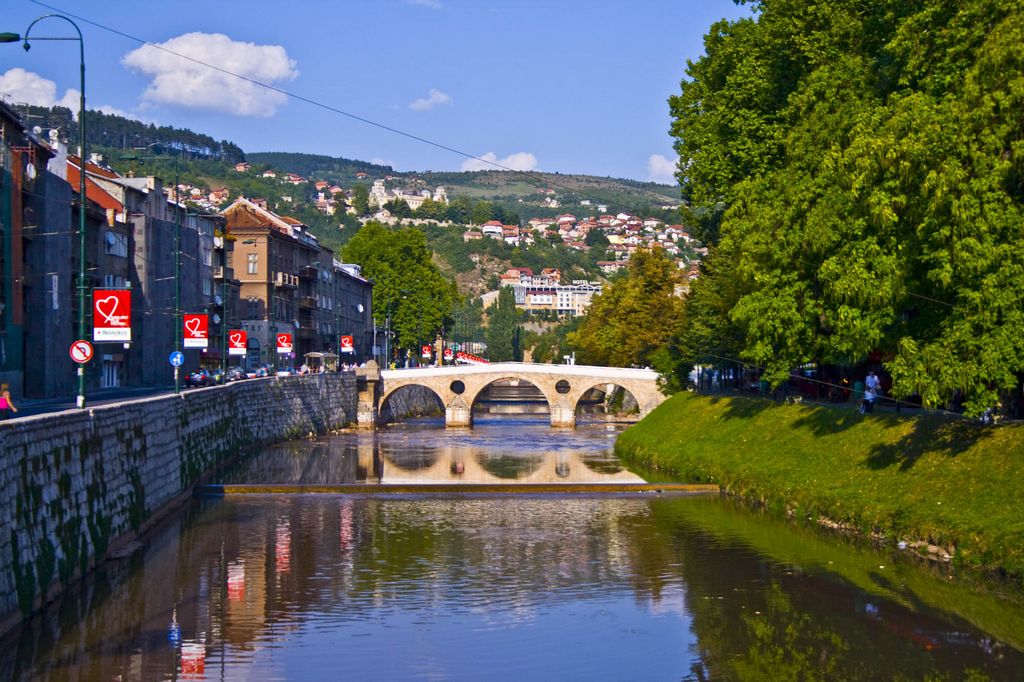In Sarajevo, the assassination ceremony year is not marketed to travelers, yet the peace is renowned
When he opened up the tea beauty parlor in 2010, he had not also considered the 2014 celebration year, nor the First World War, nor the truth that vacationers might be visiting his shop this year. ‘Franz and Sophie’ is composed on the red sign on among those Sarajevo roads that, like so numerous, climbs up the hill. Adnan Smajic’s next-door neighbor, the shoemaker nearby, jokingly intimidated him with opening up a 2nd tea beauty salon – called ‘Gavrilo Princip.’ ‘Franz and Sophie’ has a specific snide undertone, particularly in Sarajevo.
Smajic himself sees the Austro-Hungarian period as a ‘rather positive period of Bosnian development’ due to the fact that it was a time when feudalism was abandoned. On the other hand, Bosnia-Herzegovina was also a quasi-colony of Austria-Hungary at the time. ‘And tea has something to do with colonialism,’ he says. In the book edge, there are a couple of biographies regarding Franz Ferdinand. Yet no person reviews them. Smajic’s universe has to do with another thing anyhow.
Bosnian serenity
The tea beauty parlor functions as a party of Bosnian harmony. Every minute is experienced as if one were trying to check out a country very gradually. Each moment is hence swallowed like tea that leaves secrets on the tongue. This form of enjoyment is the opposite of usage. For any type of thought of money or any comparison with others as competitors would certainly destroy the tranquility.by link https://www.geo.de/reisen/reiseziele/bosnien-herzegowina-die-besten-reisetipps-fuer-sarajevo-30172558.html website It has to do with regarding others as extremely as possible. Also people on the street in Sarajevo hold their gazes for a very long time. ‘Sta ima? Gdje si?’ ‘What’s up? Where are you?’ they ask, with the ‘Gdje si’ being articulated like ‘dschesi’ and in fact useless.
It’s not easy not to think about cash in Bosnia-Herzegovina, since several Bosnians are frantically bad, and it’s nearly difficult to ignore it. But in spaces like the tea salon, it’s feasible. Adnan Smajic comes from Bijeljina, the city where the battle began in 1992. He was a doctor at the healthcare facility when one of the most awful mass killers, the guerrilla fighter Arkan, settled there. Smajic got away to Germany in 1993, functioned as a night watchman and in the pharmaceutical industry. Ten years later on, he went back to his homeland.
Some people have located it ‘dumb,’ he states, to offer 140 varieties of tea in the coffee-producing city of Sarajevo. He satisfies his suppliers in Bremen and Hamburg after they have actually brought their products from China or Japan. Fifty percent of the teas he offers are natural. He attempts to develop blends that evoke the Bosnian lifestyle. ‘My black tea is a bit mintier than in Germany,’ he explains. On the wall surface are tins with tea names like ‘African Beauty’ and ‘Franz and Sophie Cranberry Special.’
Where did the idea originated from, Mr. Sommelier? ‘In the 1990s, you could not drink respectable coffee in Germany,’ claims Smajic. ‘So I first believed I would certainly do something clever with high levels of caffeine, and after that I had the insane concept of doing something with tea in Sarajevo.’ He educated as a tea sommelier near Bonn.
Sometimes Austrians likewise pertain to his beauty salon, which is located near the sanctuary. One as soon as whispered in his ear: ‘Are you likewise a monarchist?’ The exiled doctor from Bijeljina had to laugh since the Austrian evidently really did not comprehend the Sarajevo sneer.
There are additionally a couple of extremely youngsters in the Bosnian resources that have more created the doctrine of Bosnian serenity. They marketed their apartments and bought a piece of land up on the mountain field, twelve kilometers outside the city. There they opened an eco-restaurant: The tables are constructed from glass on bundles of straw – openness and power cost savings, in other words. The food is exclusively organic, all whole grain, no meat. The very best are the soy schnitzels with kajmak, the Bosnian lotion cheese. Also the ustipci, salty Bosnian doughnuts, are constructed from whole grain.
As a whole, Ecofutura looks like it was dreamed up by a couple of Eco-friendlies from Central Europe. And Milan Demin and his pals are probably the very first Bosnian Greens. ‘It had to be close to the city, but in a wilderness setup,’ the 32-year-old discusses the project’s specs. In 2011, the dining establishment was developed entirely of straw. In some locations, you can also see the straw protruding from the gold frameworks. They call it a ‘window of truth,’ explains Demin.
The alternate scene, especially young households, gather below at Ecofutura on weekend breaks. There’s a games room. A weekend break keep for 2 individuals costs simply euro 25; throughout the week, everyone pays euro 20. Swiss guests who rented out rooms below (there are really adoringly enhanced guesthouses) have been called insane by the Bosnians, provided the rates.
Below Ecofutura lies a farming town. Sheep trudge up the courses. Over lie birch groves and huge alpine pastures, over which predators circle, and just forest and towering fields. The wood waste made use of for heating is shed as though approximately 95 percent of the energy is recouped. Below the dining establishment, there’s also an ‘adrenaline park’ where you can swing from tree to tree while wearing a harness.
Those who do not want to run away the city’s smoke can also remain in the heart of the celebratory city. The commemorative hostel is called ‘Franz Ferdinand’ and is really centrally located, to the right of the Ferhadija pedestrian boulevard. Below, for simply 10 euros, you can spend the evening under a huge sculpture of Franz Ferdinand, who stares at you even while you fantasize.
‘Pity on you, occupiers!’
The hostel owners have gotten dangers on Facebook: ‘Gavrilo Princip will come back and kick your butts forever!’ or ‘Shame on you, inhabitants!’ were allusions to the Austrian occupiers, claims hostel supervisor Emela Burdzovic. Burdzovic emphasizes, however, that this is the exception and that lots of Serbian guests come below and truly like the hostel. She doesn’t intend to ‘take sides’ anyhow, however instead earn a profit. However, it is very important to her that the furnishings is manufactured in both parts of Bosnia-Herzegovina, with some furnishings likewise coming from the predominantly Serb Republika Srpska. A buddy from New York created the concept of naming the hostel ‘Franz Ferdinand,’ and it sold well during the ceremony year. Burdzovic price quotes that around 30 percent come due to the name, many from Australia, Japan, and the United States.
The hostel resembles a museum: Timelines on the floorings and walls provide information concerning events that occurred a century earlier. Also the destiny of the ill-fated vehicle in which the beneficiary to the throne passed away is recounted in detail. On the first flooring, images and quotes highlight the First World War. Visitors can stay in an area dedicated to the German basic Albrecht Freiherr von Richthofen. One area commemorates the Salonika front, one the Battle of Verdun, and one Gavrilo Princip. It is among the most prominent spaces in the hostel, where visitors sleep in white bunk beds reminiscent of ship’s cabins.
‘Did this person get his name from the band Franz Ferdinand?’ Burdzovic was as soon as asked by a guest who pointed to the large photo of the beneficiary to the throne with the mustache at the function. The hostel was developed with the guidance of the murder gallery.
This lies next to the Latin Bridge, called the ‘Princip Bridge’ throughout Yugoslavia, where Franz Ferdinand and Sophie were performed. The tiny gallery does not have much to use. An exhibit that clarifies the occasions with distance and scholarly precision is missing in the Bosnian resources.
This is specifically what one would certainly hope for at Vacation home Austria in Ilidza, where Franz Ferdinand and Sophie stayed prior to they were assassinated. The medical spa community on the outskirts of Sarajevo still preserves its Kakanian charm, but its visitors are primarily from the Arab globe. Incidentally, Vacation home Austria was called ‘Vila Srbija’ throughout the Yugoslav period. During the Bosnian Battle (1992-1995), it housed UN soldiers; today, it waits for a financier.
In the room with a terrace on the initial floor where the successor to the throne spent his last evening, there is now rubble and a tattered carpeting. There is no suggestion of Franz Ferdinand and Sophie. The fact that the historic event in Sarajevo is receiving little promotion shows the unpredictability about just how to handle this delicate subject. (Adelheid Wolfl, DER STANDARD, Cd, March 22, 2014)



